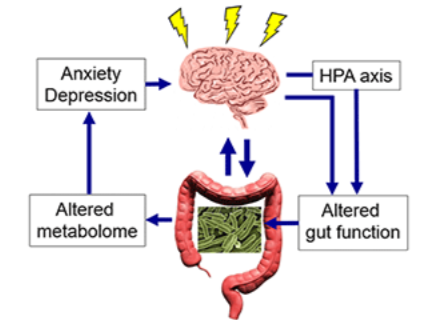Improving Digestion for Children
Psychological stress and depression can lead to consumption of highly palatable foods on which gut bacteria thrive. Stress can also change the composition of gut microbiome through release stress hormones. They cause gut inflammation and in turn lead to release of metabolites, toxins and neurohormones that can alter eating behaviour and mood.
Modern practices such as western diet, antibiotic use, and high stress lifestyle cause gut bacterial imbalances, called dysbiosis. They also lead to low diversity, referring to smaller count, and uneven distribution of bacterial species. This may alter food cravings, metabolism, stress reactivity, mood, and thereby compromising immune function and health.

How stress can lead to leaky gut?
When we experience stress the brain releases chemical called corticotrophin releasing factor (CRF). CRF triggers release of the stress hormone called cortisol from the adrenal glands but CRF receptors are located in the gut itself. This means that the release of CRF impacts the digestive system directly. Through the effects of CRF on gut, stress can result in changes in intestinal motility, sensitivity and inflammation, which may be experienced as constipation or pain or gastrointestinal upset. Stress can also alter intestinal permeability.
Substances that should ordinarily not be allowed to pass through, like large protein particles from food, may seep through the wall. When this happens, immune system tags the substance as antigen and creates an immune response against them increasing inflammation and creating antibodies which may cross react with body`s own tissues leading to autoimmune reaction.
Symptoms and conditions associated with increased permeability include abdominal bloating, indigestion, joint pain, fuzzy thinking, mood swings, fatigue and food allergies.
The good thing is we can heal the intestinal epithelium through right foods and lifestyle:
- Glutamine is the primary fuel source for cells lining the intestinal wall. They help body to produce more intestinal mucus and secretory IGA, regenerate gut cells and also tighten openings along intestinal wall. Good sources are eggs, chicken, fish, whey protein. Bone broths are also rich in L-Glutamine.
- Vitamin A, C and D are important in supporting secretory IGA function and restoring the mucosal immune system. Vitamin A rich foods include carrots, sweet potato, papaya, mango, spinach. Vitamin C through citrus fruits, bell peppers and Vitamin D from oily fishes, eggs, mushrooms.
- Including pre and probiotic foods – Prebiotics are non-digestible carbohydrates that are metabolised by our gut microbes and are high in fibre. They help nourish the microbial species that exist in the gut. Oats, onion, garlic, lentils, beans, fruits and vegetables are rich in prebiotics. For probiotics, eat fermented foods as they carry good bacteria and help provide energy to intestinal cells. Foods rich in probiotics are yogurt, Idli, dhokla, appam, rice kanji and beet carrot kanji.
- Eliminate all known foods that you are sensitive to. This can be determined through comprehensive elimination diet or IGG/IGE food tests on the blood.
- Managing stress by including yoga, meditation, deep breathing and spending time in nature.

